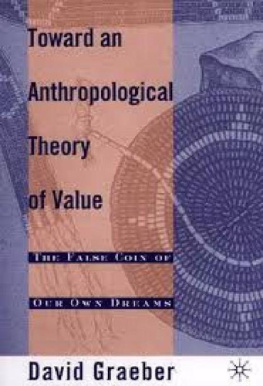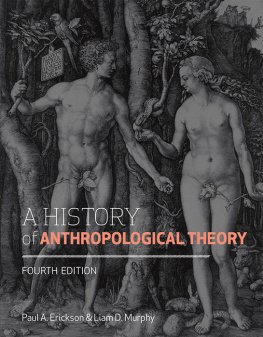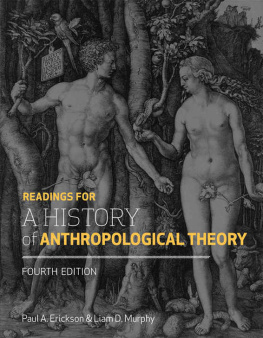READERS in the social sciences and their various divisions and subdivisions have proliferated so rapidly in the past few years that it is now very difficult to assemble a collection which does not come out looking like a reader of readers, or what someone has referred to as a non-book, out of non-books by non-authors. Consequently, any new collection of old writings must justify itself. Our reasons for compiling the present sourcebook were twofold. First, since a collection of this kind had not been done before, we were not really embarking on a reader of readers. But, more important, our experience with courses in anthropological theory persuaded us of the need for making accessible in a single volume a sample of those important pieces which are presently scattered in numerous publications, some of which are difficult for the student to obtain.
Our second reason had to do with certain convictions we hold about the aims and methods of anthropology. Kluckhohn's 1939 assertion that the very word theory has a pejorative connotation for most American anthropologists, and his conclusion: To suggest that something is theoretical is to suggest that it is slightly indecent, impress us as no longer appropriate, because anthropologists nowadays do a great deal of talking about theory (The Place of Theory in Anthropological Studies, Philosophy of Science, VI: 333). However, it seemed to us that there was considerable confusion about theoryhow it might be defined, how it was developed, how it was applied, and how one went about confirming or disconfirming it. To us, therefore, the more exciting reason for undertaking this book was that it offered an opportunity to examine and evaluate these intellectual concerns of anthropology.
There are, of course, many different ways to organize a book which deals with these concerns, and organization as well as content will obviously reflect the biases and the interests of the compilers. This book is no exception. We have, however, made a strong effort to keep our own biases and particular views on theory from dominating the final product. As a matter of fact, it was precisely because our own views on theory seemed often to differ from those of many anthropologists that we felt impelled to write the introductory essay which follows.
As the process of selection progressed we were often torn between the anthropologists' broader view of theory, on the one hand, and our own somewhat more restricted view of theory, on the other. Now, looking at the end result, we find we have in effect straddled these two views of theory. And we believe that this seeming vacillation imparts to the book a balance within our biases.
We should also like to make it clear that we were far less interested in putting together a reader in the history of anthropological theory than we were in assembling a collection that would reflect the current theoretical interests of anthropology. This will explain the absence from our Table of Contents of the names of many distinguished anthropologists of the past, such as Tylor, Boas, Malinowski, and Kroeber. In some cases their theoretical ideas have either been superseded by or incorporated into the writings of contemporary anthropologists and have been improved in the process. In other cases their work, whatever other merit it may have, seems to have left little or no impress on current anthropological theory.
The reader will note that while we have thus omitted from our collection a number of outstanding figures in the history of anthropology, we have included a number of essays by writers outside the disciplinewriters who in our view have illuminated problems that are of direct concern to anthropological method and theory. We found that on a variety of theoretical issues writers in other fields had either said it better than it had been said before or, in some instances, were saying things that had not been said beforeat least not by anthropologists.
A few words about the organization of the book are in order here. The first of the eight sections into which the volume is divided is entitled Overview. We have included in this segment a number of essays meant in a general way to convey something of the scope of anthropology and to introduce some of its basic concepts.
Each of the five pieces in this section addresses itself to a somewhat different issue: The Gluckman essay emphasizes the scientific aspect or dimension of anthropology, while Evans-Pritchard is concerned with the more humanistic side of the discipline. Eggan's contribution attempts to reconcile the traditional British and American approaches to the subject at the same time that it stresses the significance to anthropological inquiry of the method of controlled comparison. David Kaplan's essay is addressed to the vexed issue of the autonomy of sociocultural phenomena and the general question of reductionism in the sciences. White's critique of Kroeber and Kluckhohn is concerned with the problem of defining culture. A central point of his argument is that confusion often flows from the failure to distinguish nominal from real definitions.
While most American anthropologists continue to view culture as their key concept, a great deal of criticism has been leveled at this emphasis on the grounds that the term is too broad, too all-inclusive, to be used as an analytic tool. It has often been agreed that a term less broad, such as social structure, proves in practice to be more useful for the analysis and understanding of sociocultural systems. In this latter view, culture is often seen as epiphenomenalas the product of social relationships. In our view, however, there are at least two important respects in which the culture concept has heuristic advantages over more restricted concepts like social structure. First, human social life is preeminently shaped by culture, and even if one is prepared to attribute proto-culture to species other than man, certainly the impact of culture on human social life is incomparably greater than it is on the social life of all other animal species. Such concepts as social system, structure, or society used by themselves tend to obscure this important difference.














